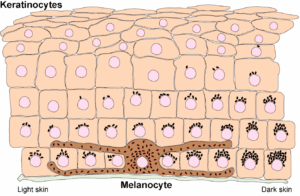Understanding Dry Skin: How to Hydrate and Boost Skin Hydration
At Cameo College, we understand the importance of nurturing your skin for a healthy and vibrant appearance. Dry skin can be a common concern, especially for those interested in pursuing a career in beauty and skin care. Our goal is to equip prospective students with the knowledge and skills needed to effectively manage this skin type, ensuring optimal skin hydration and overall health. Understanding the nuances of dry skin is the first step towards crafting an effective skin care routine that addresses individual needs.
What is Dry Skin?

Photo by Alexander Grey on Unsplash
Dry skin is a condition characterized by a lack of adequate moisture within the skin, often resulting in a flaky, itchy, or scaly texture. This skin type may feel tight or rough, and it lacks the natural oils necessary to maintain a supple appearance. While dry skin can affect anyone, it is particularly common in individuals with sensitive skin or those exposed to harsh environmental conditions. Understanding the fundamental nature of dry skin is crucial for developing a skin care routine that can effectively hydrate and protect your skin.
Causes of Dry Skin
Various factors can lead to dry skin. Some of these include:
- Environmental elements such as cold weather, low humidity, and excessive exposure to the sun without proper sunscreen protection.
- Frequent bathing or the use of harsh cleansers that can strip the skin of its natural oils.
Genetic predispositions and certain medical conditions may also contribute to dry skin, making it essential to identify the root cause in order to effectively address and relieve the symptoms.
Signs of Dehydrated Skin
Dehydrated skin is a temporary condition that differs from dry skin but often presents similar symptoms. When skin is dehydrated, it lacks water rather than oil, leading to a dull appearance, fine lines, and a feeling of tightness. You may notice that your skin feels dry, yet it may still produce oil, leading to a confusing mix of skin concerns. Identifying signs of dehydration is crucial, as it allows you to adjust your skin care products and routine to add moisture and keep your skin hydrated effectively.
When to Consult a Dermatologist
While numerous skin care products can help relieve dry skin, there are instances when consulting a dermatologist is necessary. If your skin becomes excessively itchy, flaky, or develops persistent redness or irritation, professional guidance can help determine the underlying cause and recommend appropriate treatments. A dermatologist can provide insights into advanced skin care options, such as products that contain hyaluronic acid or glycerin, to improve skin hydration and strengthen the skin barrier. At Cameo College, we emphasize the importance of knowing when to seek expert advice to protect your skin and maintain its health.
Importance of Skin Hydration

Photo by Daiga Ellaby on Unsplash
Why Hydrate Your Skin?
Hydration is a fundamental aspect of maintaining healthy skin, and at Cameo College, we emphasize its importance to our students. Hydrating your skin helps to maintain its elasticity, reduces the appearance of wrinkles, and enhances the overall health of your skin. When you hydrate your skin, you support the skin cells’ ability to function optimally, creating a protective barrier that retains moisture and repels external irritants. This is especially crucial for those dealing with dry skin, as proper hydration can relieve dry skin symptoms and promote a radiant complexion.
How Hydration Affects Skin Health
The health of your skin is deeply connected to its hydration levels. When your skin is well-hydrated, it appears plump and smooth, reflecting light evenly for a natural glow. Adequate hydration helps flush out toxins and dead skin cells, reducing the risk of clogged pores and breakouts. For individuals with dry or sensitive skin, maintaining skin hydration can alleviate itchiness and prevent the formation of flaky or scaly patches. At Cameo College, we teach students how to incorporate effective hydration techniques into their skin care routines to optimize skin health.
Keep Your Skin Hydrated: Daily Practices
To keep your skin hydrated, it’s essential to adopt daily practices that promote moisture retention. Here are some key practices to consider:
- Choose a gentle cleanser that does not strip away natural oils.
- Always apply a moisturizer while your skin is still damp to lock in moisture.
- Use a humidifier in dry environments to help add moisture to the air, benefiting your skin.
- Stay hydrated by drinking plenty of water to support the skin’s natural moisture barrier.
Our curriculum at Cameo College includes teaching these daily practices to future beauty professionals.
Effective Ways to Hydrate Your Skin

Photo by Moose Photos on Pexels
Choosing the Right Moisturizer
Selecting the right moisturizer is vital to effectively hydrate your skin. Look for products that contain ingredients like hyaluronic acid and glycerin, which attract and retain moisture within the skin. For those with dry skin, a thicker cream or ointment with ingredients such as petroleum jelly can provide a more substantial barrier against moisture loss. At Cameo College, we guide our students in identifying the best products for different skin types, ensuring they can recommend suitable options for clients seeking to improve their skin hydration.
Home Remedies for Relieving Dry Skin
Home remedies can be an effective way to relieve dry skin and enhance hydration. Simple practices like applying a honey mask, which has natural humectant properties, can help retain moisture in your skin. Other remedies include using oatmeal baths to soothe itchy and irritated skin, or applying aloe vera gel to help relieve dry, flaky skin. These natural solutions are part of the comprehensive skin care education we provide at Cameo College, enabling our students to offer holistic advice to their clients.
Using Face Masks for Extra Skin Hydration
Face masks are an excellent way to add an extra layer of hydration to your skin care routine. Masks infused with ingredients like hyaluronic acid, aloe vera, or cucumber can provide an instant boost of moisture, making them ideal for quick skin hydration. Regular use of hydrating face masks can help maintain the skin’s moisture balance, resulting in a more supple and hydrated appearance. At Cameo College, we teach students how to incorporate these treatments into personalized skin care plans, ensuring their clients achieve optimal skin health.
Utilizing Products for Your Skin Type

“Melanosome distribution in keratinocytes in different skin types” by Liliana Bento-Lopes, Luís C. Cabaço, João Charneca,Matilde V. Neto, Miguel C. Seabra & Duarte C. Barral is licensed under CC BY 4.0
Identifying Your Skin Type
Understanding your skin type is essential for developing an effective skin care routine. At Cameo College, we teach our students to identify various skin types, such as dry, oily, sensitive, or combination skin. Recognizing the characteristics of your skin type, including dryness, oiliness, or sensitivity, allows you to select products that cater specifically to your needs. Here are some key points to consider:
- Accurate identification helps in choosing the right cleanser, moisturizer, and other skin care products to promote healthy skin.
- Address specific conditions such as dry skin by selecting suitable products.
Recommended Products for Dry Skin
For those with dry skin, selecting the right products is crucial to maintaining optimal moisture within the skin. We recommend using a gentle cleanser to avoid stripping the skin of its natural oils. Follow up with a rich moisturizer containing ingredients like hyaluronic acid or glycerin, which help to hydrate your skin and reinforce the skin barrier. Creams with petroleum jelly can also provide a protective layer to lock in moisture. These recommendations form part of the curriculum at Cameo College, ensuring our students can guide clients in choosing effective products.
Importance of Sunscreen in Skin Care
Incorporating sunscreen into your daily skin care routine is vital for protecting your skin from harmful UV rays. Even if your skin feels dry, applying a broad-spectrum sunscreen with an adequate SPF helps prevent further damage and premature aging, such as wrinkles. Sunscreen protects the layers of the skin and maintains moisture levels by preventing dehydration caused by sun exposure. At Cameo College, we stress the importance of sunscreen in maintaining healthy skin, educating students on how to integrate it seamlessly into skin care regimens.
Environmental Factors and Skin Hydration

Photo by Eva Bronzini on Pexels
Using a Humidifier to Prevent Dryness
Environmental factors, such as low humidity, can significantly impact skin hydration levels. Using a humidifier in your home or workplace can add moisture to the air, helping to prevent your skin from becoming dry and flaky. This is particularly beneficial during the winter months when indoor heating systems can exacerbate dry skin conditions. At Cameo College, we teach our students about the benefits of using a humidifier as part of a comprehensive approach to maintaining skin hydration and health.
Impact of Weather on Skin Health
Weather conditions play a significant role in the health of your skin. Cold, windy weather can strip moisture from the skin, leading to dryness and irritation, while hot, humid weather can exacerbate oily skin conditions. Understanding how different climates affect skin health allows you to adjust your skin care routine accordingly. At Cameo College, we educate students on the importance of adapting skin care practices to changing weather conditions, ensuring clients receive tailored advice to maintain healthy, hydrated skin year-round.
Staying Hydrated: Internal and External Methods
Staying hydrated is key to maintaining the health of your skin. Internally, drinking plenty of water helps keep your skin hydrated from within. Externally, using skin care products that add moisture, such as hydrating masks and moisturizers, can help relieve dry skin. Washing your face with a gentle cleanser and applying moisturizer immediately after helps lock in moisture. At Cameo College, we emphasize the importance of a holistic approach to hydration, combining internal and external methods for optimal skin health and hydration.

